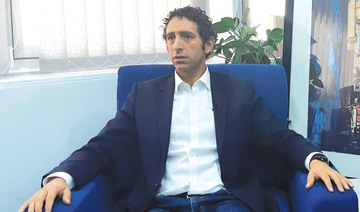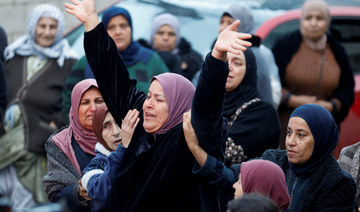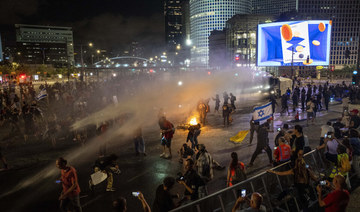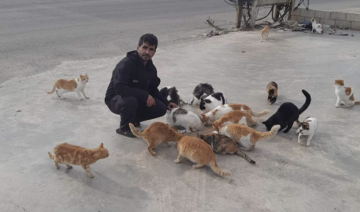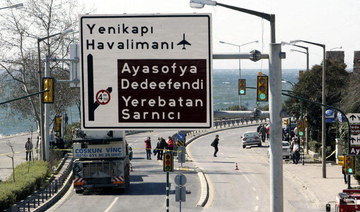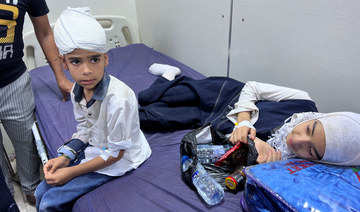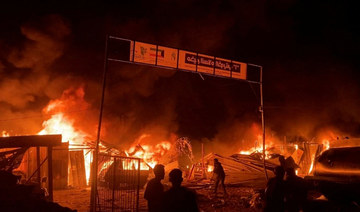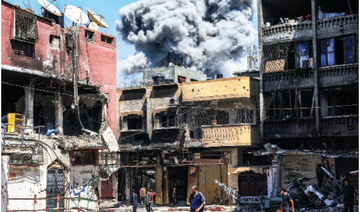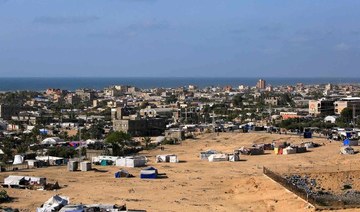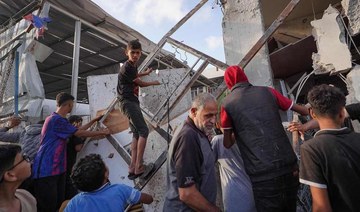CAIRO: Motorized rickshaws known as tuk-tuks have ruled the streets of Cairo’s slums for the past two decades, squeezing through dusty alleys, dodging trash bins and fruit stands, blaring rhythmic electro-pop and navigating the city’s chaos to haul millions of Egyptians home every day.
Now the government is taking its most ambitious stand yet again against the polluting three-wheeled vehicles: in a push to modernize the country’s neglected transport system, it plans to replace tuk-tuks with clean-running minivans.
“This is for the health and safety of all Egyptians,” said Khaled El-Qassim, the spokesman for Egypt’s Ministry of Local Development, which is spearheading the initiative. “We’re creating a more beautiful image of our country.”
The state had long turned a blind eye as tuk-tuks became part of the fabric of life in Cairo’s vast informal settlements.
The new plan requires that drivers sell their tuk-tuks for scrap and take loans to buy new minivans — or risk fines and even prosecution. It has raised fears that the poorest Egyptians, already squeezed by economic austerity measures, will shoulder the bulk of the burden.
“I’d rather work as a thief than pay for this minivan,” said Ehab Sobhy, a 47-year-old who earns 130 pounds, about $8, a day plying the densely-packed district of Shobra in his weathered black-and-yellow tuk-tuk, sporting a decorative Islamic sticker in place of a license.
“If they take this away … how is my family going to eat,” asked Sobhy. Even with a government loan, he said he wouldn’t be able to afford the 90,000 pounds he estimates he’d need for the new minivan.
“They’ll bring money to the banks, all at the expense of the people,” declared Mohammed Zaydan, a 52-year-old father of five who started driving a tuk-tuk after struggling to find work as a painter. “If they ban the tuk-tuk, they trample on the poor.”
Former President Hosni Mubarak’s government tried to stem the tide of tuk-tuks, banning them in most of Cairo’s affluent neighborhoods but it also allowed tuk-tuk parts to flow from South Asia to Egypt, where auto manufacturers legally assembled and sold the unlicensed vehicles.
It was a classic example of the state’s contradictory approach toward the informal economy, which accounts for as much as 50 percent to 60 percent of Egypt’s GDP, according to the International Labor Organization.
“Because of its limited capacities, the state lives with deeply embedded informality,” or do-it-yourself infrastructure, like unauthorized housing, which saves the government from providing mass services to the poor, said Amr Adly, a Cairo-based political economy expert.
The business exploded, with rickshaws becoming especially popular with disabled people, the elderly and women who want to avoid harassment at crowded bus stops.
But that could soon change.
Now President Abdel-Fattah El-Sisi’s government, which has spent the past five years trying to revamp Egypt’s image, is taking aim at the unregulated vehicles.
Last year, it passed a traffic law requiring that all new buyers license their tuk-tuks. Ghabbour Group, the country’s largest auto producer, was hard hit, its tuk-tuk sales dropping by 60 percent.
In September, Prime Minister Mostafa Madbouly announced a sweeping plan to phase out tuk-tuks in 20 governorates, swapping them for seven-seater gas-powered minivans. The proposal, offering drivers a payoff period of up to five years, bars all tuk-tuks from cities and main roads but allows new and licensed tuk-tuks to continue operating in narrow alleys and rural villages.
Egypt’s finance and military production ministries, along with three major auto manufacturers, have opened an economic review to hammer out the details, and expect the microbuses to hit the streets within a year.
El-Qassim, the spokesman for the development ministry, said the tuk-tuks contribute to congestion, air pollution and fatal car crashes — even terrorism, since the government can’t trace unlicensed vehicles. He described them as a drag on Egypt’s economic productivity, keeping teenagers out of school and depriving the state of revenue from registration fees and taxes.
But skeptics question the logic of changing a tuk-tuk prized for its tiny size, high maneuverability and cheap fare for a microbus that manufacturers expect to be four times the size and price.
“It’s a reflection of how the state is more obsessed with appearances than investing in the infrastructure of where people actually live,” said Rabab El-Mahdi, a political scientist at the American University in Cairo.
Since taking power in 2014, El-Sisi has focused on ambitious mega-projects, building high-end housing complexes and a sprawling $45 billion new administrative capital in the desert outside Cairo. The bigger goal is to revive tourism and attract foreign investment as the country recovers from the turmoil of the 2011 Arab Spring uprising that toppled Mubarak.
Meanwhile, much of Cairo has spiraled into disrepair and decay. The official statistics agency recently reported that one third of Egyptians live in poverty. Tough austerity measures imposed to stave off economic collapse have slashed subsidies and dramatically hiked up prices of everything from subway fares to drinking water, taking a heavy toll on working-class Egyptians.
In September, sharp economic discontent and allegations of government corruption marshaled small but rare protests against the president. Security forces arrested thousands, escalating a long-running crackdown.
“The state is much more willing and able to go down with a heavy hand,” said El-Mahdi, adding that the military mindset has created a governmentwide shift.
Still, observers note that enforcing the new plan will pose a challenge. Much remains uncertain, including how the government will guarantee registration among those more accustomed to bribing police than obeying traffic laws.
“People will be trying to resist, to circumvent these developments, to go on living,” said Yasser Elsheshtawy, professor of architecture at Columbia University. “This is something very Egyptian.”
Egyptian government seeks to do away with popular tuk-tuks
Egyptian government seeks to do away with popular tuk-tuks

- Cairo plans to replace tuk-tuks with clean-running minivans
- ‘If they take this away … how is my family going to eat’
Israel army says kills Palestinian teen after West Bank ‘attempted attack’
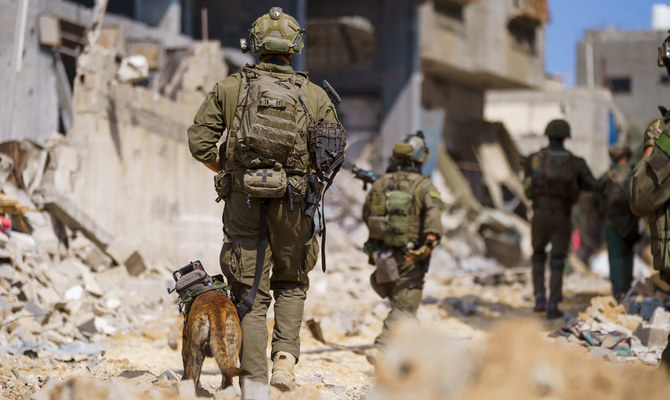
- The deadly incident took place near Hebron in the southern West Bank, the army and the Palestinian ministry said
JERUSALEM: Israel’s military said its troops killed a Palestinian assailant in the occupied West Bank, with the Palestinian health ministry identifying him as a teenager.
Israeli forces “identified a terrorist who came in their direction and attempted to carry out a stabbing attack,” a military statement said.
“The soldiers fired at him and killed him,” it said.
The Palestinian health ministry identified the fatality as Majd Shahir Aramin, 14, and said he had been killed by Israeli forces.
The deadly incident took place near Hebron in the southern West Bank, the army and the Palestinian ministry said.
The West Bank, which Israel has occupied since 1967, has seen a surge in violence for more than a year, but especially since the Israel-Hamas war erupted on October 7.
According to Palestinian officials, at least 519 Palestinians have been killed in the West Bank by Israeli troops or settlers since the start of the war in the Gaza Strip.
Attacks by Palestinians have killed at least 12 Israelis in the West Bank over the same period, according to an AFP tally of Israeli official figures.
Israeli police and Jewish pilgrims clash at beleaguered festival site
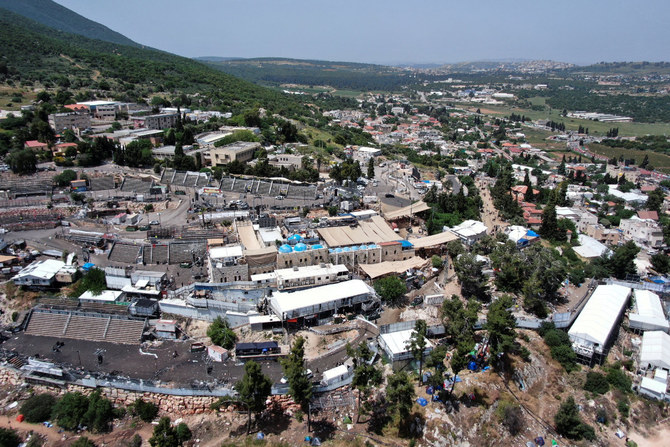
- The all-night sessions of prayer, mystical songs and dance had in previous years drawn crowds in the tens of thousands
- Police limited the number of attendees since the 2021 tragedy in which 45 people died in a crowd rush
JERUSALEM: Clashes erupted on Sunday between police and Jewish pilgrims at a religious festival site in northern Israel where three years ago 45 people died in a crowd crush, and which authorities closed this year due to rocket fire from Lebanon.
Since the 2021 tragedy at the tomb of a 2nd-century sage during the annual Lag B’Omer celebration, police have limited the number of attendees.
The all-night sessions of prayer, mystical songs and dance had in previous years drawn crowds in the tens of thousands.
This year’s festival was canceled since the site at Meron in the Galilee region has been targeted by rocket fire from Lebanon.
Many northern Israeli towns have been evacuated since Iran-backed Hezbollah in Lebanon began firing at them following Hamas’ Oct. 7 assault on southern Israel, which sparked the war in Gaza.
Both sides have traded blows since. Despite the closure, police said they turned away thousands of pilgrims over the weekend, though hundreds managed to reach the site, where things got out of hand.
The visitors damaged property and hurled objects at officers, police said. Nineteen officers were injured.
Israeli media reported that several people among the unauthorized crowd were hurt. At least one officer was suspended for pushing an older man to the ground, and police said it was examining other incidents from the site.
Ten dead, 39 injured in southern Turkiye highway collision
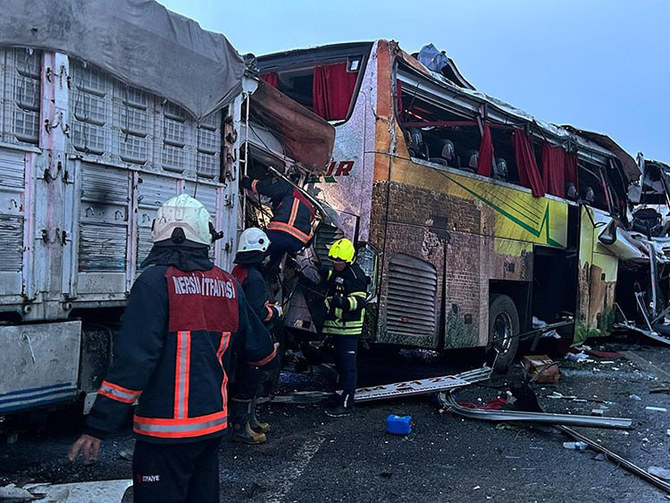
ISTANBUL: Ten people died and 39 others were injured in southern Turkiye on Sunday when an intercity bus collided with three other vehicles on a main highway, Interior Minister Ali Yerlikaya said.
The bus, traveling to Istanbul from Diyarbakir, crashed into a transport truck and two other vehicles in the Tarsus district near the Mediterranean city of Mersin, he said on social media platform X.
The government said an investigation had been launched.
Israel war cabinet to discuss new push for Gaza hostage deal
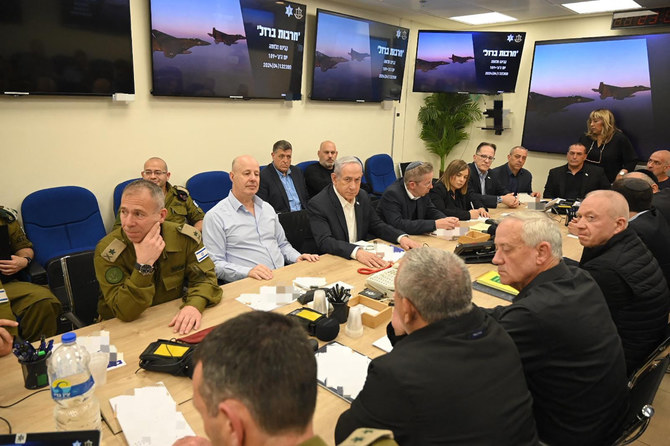
- Hamas eader Izzat Al-Rishq jas accused Netanyahu earlier Sunday of “trying to buy more time to continue the aggression"
RAFAH, Palestinian Territories: Israeli Prime Minister Benjamin Netanyahu said Sunday he “strongly opposes” ending the war in Gaza, ahead of his war cabinet convening amid intense diplomacy to forge a truce and hostage release deal.
Meanwhile deadly fighting rocked the Gaza Strip and Hamas militants fired a salvo of rockets at Israel’s commercial hub Tel Aviv for the first time in months, sending people scrambling for shelter.
Netanyahu has long rejected Hamas’s demand in negotiations for a permanent end to the fighting, which was triggered by the Palestinian militant group’s October 7 attack and has left vast areas of besieged Gaza in ruins.
A senior Israeli official, speaking on condition of anonymity, had earlier told AFP that “the war cabinet is expected to meet... tonight at 9 p.m. (1800 GMT) to discuss a hostage release deal.”
A statement issued by Netanyahu’s office before the meeting said Hamas chief in Gaza Yahya “Sinwar continues to demand the end of the war, the withdrawal of the IDF (army) from the Gaza Strip and leaving Hamas in place, so that it will be able to carry out the atrocities of October 7 again and again,” referring to the attack that triggered the war.
“Prime Minister Netanyahu strongly opposes this,” the statement said.
A member of Hamas’s political leadership, Izzat Al-Rishq, accused Netanyahu earlier Sunday of “trying to buy more time to continue the aggression.”
In Brussels, the European Union’s foreign policy chief Josep Borrell told journalists before meeting Palestinian premier Mohammed Mustafa that a strong Palestinian Authority (PA) was in Israel’s interest.
EU members Ireland and Spain, and also Norway, have said they will recognize the State of Palestine from Tuesday, drawing furious Israeli condemnation.
“A functional Palestinian Authority is in Israel’s interest too, because in order to make peace, we need a strong Palestinian Authority, not a weaker one,” Borrell said.
Mustafa, whose government is based in the occupied West Bank, said the “first priority” was to support people in Gaza, especially through a ceasefire, and then “rebuilding the institutions of the Palestinian Authority” there after Hamas seized it from the PA in 2007.
US President Joe Biden has pushed for renewed international efforts to halt the war, now in its eighth month.
The Israeli official had said Saturday that “there is an intention to renew these talks this week” after negotiations involving US, Qatari and Egyptian mediators stalled in early May.
However, Rishq said Sunday that so far, “we have not received anything from the mediators.”
He insisted on Hamas’s long-standing demand for a permanent cessation of hostilities as “the foundation and the starting point for anything.”
Netanyahu has repeatedly vowed to destroy Hamas following the October 7 attack, but has also faced growing domestic and international criticism.
The attack on southern Israel resulted in the deaths of more than 1,170 people, mostly civilians, according to an AFP tally based on Israeli official figures.
Militants also took 252 hostages, 121 of whom remain in Gaza, including 37 the army says are dead.
Israel’s retaliatory offensive has killed at least 35,984 people in Gaza, mostly civilians, according to the Hamas-run territory’s health ministry.
The military on Sunday announced the death of a soldier in north Gaza, taking to 289 the number of troops killed since Israel began its ground offensive in late October.
As the war ground on, the families of hostages still held by Palestinians militants have piled pressure on Netanyahu to secure a deal to free them.
Washington has also taken a tougher line with its close ally as outrage over the war and US support for Israel has become a major issue for Biden, seeking re-election in a battle against Donald Trump.
With more strikes reported Sunday across Gaza, Israel’s military said that over the past 24 hours it had destroyed “over 50 terror targets.”
Fighting has centered on the far-southern city of Rafah, where Israel launched a ground operation in early May despite widespread opposition over concerns for civilians sheltering there.
Rafah resident Moaz Abu Taha, 29, told AFP of “constant bombardment from land and air, which has destroyed many houses.”
Gaza’s civil defense agency said it had retrieved six bodies after a house was targeted in eastern Rafah.
Hamas’s armed wing said it had targeted Tel Aviv “with a large rocket barrage in response to the Zionist (Israeli) massacres against civilians.”
Israeli military spokesman Rear Admiral Daniel Hagari told a televised briefing that “Hamas terrorists in Gaza fired eight rockets at central Israel from Rafah.”
“Hamas launched these rockets from near two mosques in Rafah,” Hagari said. “Hamas is holding our hostages in Rafah, which is why we have been conducting a precise operation” there.
Analyst Neomi Neumann said the militants were not trying to “cause damage to Israel, but to maintain continuity of fire.”
They “shoot relatively few rockets per barrage from their diminishing arsenal, and choose when to concentrate their efforts,” said Neumann, a visiting fellow at the Washington Institute for Near East Policy think tank.
The UN has warned of looming famine in the besieged territory, where most hospitals are no longer functioning.
Amid the bloodiest ever Gaza war, Israel has faced growing global outcry over the surging civilian death toll, and landmark moves last week at two international courts.
Last Monday, the prosecutor at the International Criminal Court announced he was seeking arrest warrants for Netanyahu and his defense minister as well as for three top Hamas figures.
And on Friday, the International Court of Justice ordered Israel to halt its Rafah offensive or any other operation there that could bring about “the physical destruction” of the Palestinians.
Palestinian medics say Israeli airstrikes on refugee camp in Rafah kills 35
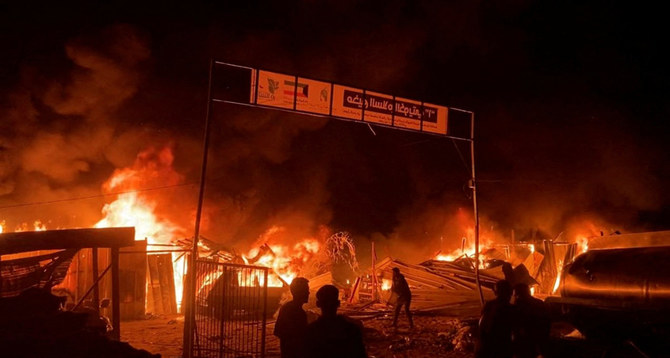
- The attacks came two days after the International Court of Justice ordered Israel to end its military offensive in Rafah
- Israel’s army confirmed the strike and said it hit a Hamas installation and killed two senior Hamas militants
DEIR AL-BALAH, Gaza Strip: Palestinian health workers said Israeli airstrikes killed at least 35 people Sunday and hit tents for displaced people in the southern Gaza city of Rafah, and “numerous” others were trapped in flaming debris. Gaza’s Health Ministry said women and children made up most of the dead and dozens of wounded.
The attacks came two days after the International Court of Justice ordered Israel to end its military offensive in Rafah, where more than half of Gaza’s population had sought shelter before Israel’s incursion earlier this month. Tens of thousands of people remain in the area while many others have fled.
Footage from the scene of the largest airstrike showed heavy destruction. Israel’s army confirmed the strike and said it hit a Hamas installation and killed two senior Hamas militants. It said it was investigating reports that civilians were harmed. Defense Minister Yoav Gallant was in Rafah on Sunday and was briefed on the “deepening of operations” there, his office said.
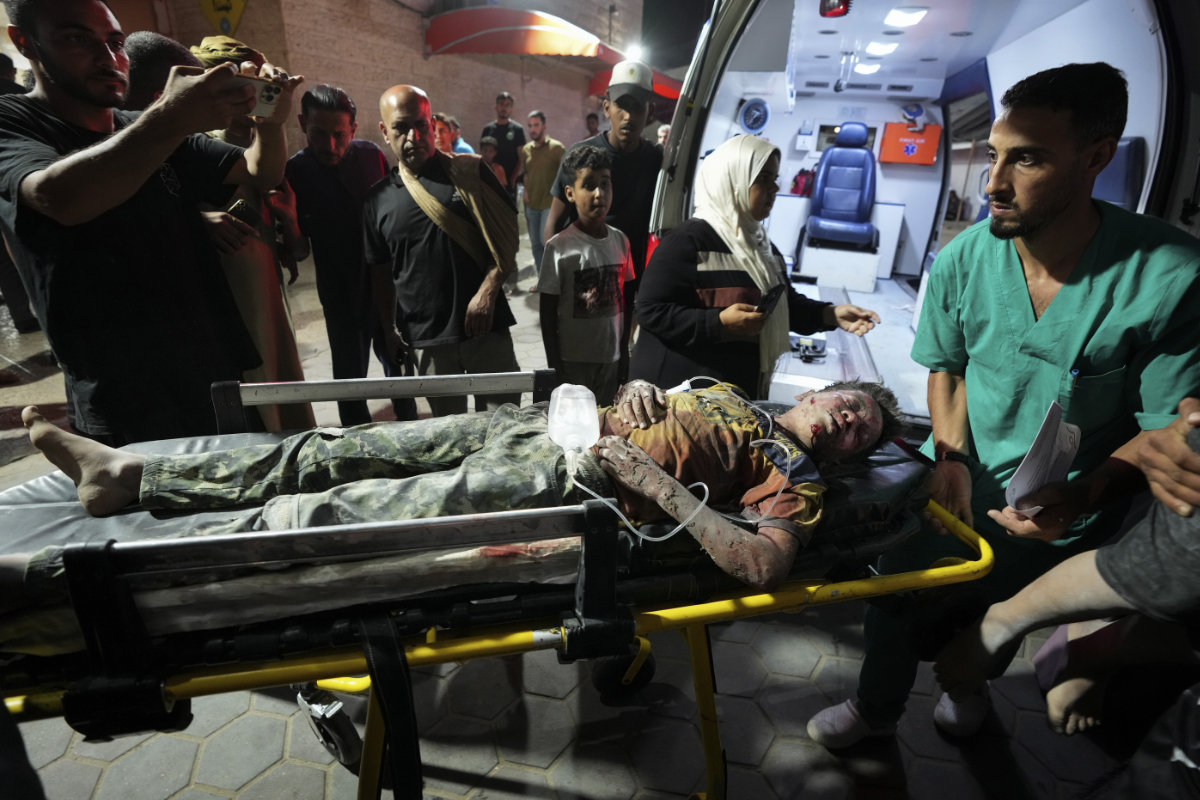
A spokesperson with the Palestinian Red Crescent Society said the death toll was likely to rise as search and rescue efforts continued in Rafah’s Tal Al-Sultan neighborhood about two kilometers (1.2 miles) northwest of the city center.
The society asserted that the location had been designated by Israel as a “humanitarian area.” The neighborhood is not included in areas that Israel’s military ordered evacuated earlier this month.
The airstrike was reported hours after Hamas fired a barrage of rockets from Gaza that set off air raid sirens as far away as Tel Aviv for the first time in months in a show of resilience more than seven months into Israel’s massive air, sea and ground offensive.
There were no reports of casualties in what appeared to be the first long-range rocket attack from Gaza since January. Hamas’ military wing claimed responsibility. Israel’s military said eight projectiles crossed into Israel after being launched from Rafah and “a number” were intercepted, and the launcher was destroyed.
Earlier Sunday, dozens of aid trucks entered Gaza from southern Israel under a new agreement to bypass the Rafah crossing with Egypt after Israeli forces seized the Palestinian side of it earlier this month. Israel’s military said 126 aid trucks entered via the nearby Kerem Shalom crossing.
But it was not immediately clear if humanitarian groups could access the aid — including medical supplies — because of fighting. The crossing has been largely inaccessible because of Israel’s offensive in Rafah. United Nations agencies say it is usually too dangerous to retrieve the aid. The World Health Organization last week said an expanded Israeli incursion in Rafah would have “disastrous” impact.”
“With the humanitarian operation near collapse, the secretary-general emphasizes that the Israeli authorities must facilitate the safe pickup and delivery of humanitarian supplies from Egypt entering Kerem Shalom,” the spokesperson for UN chief Antonio Guterres said in a statement.
Egypt refuses to reopen its side of the Rafah crossing until control of the Gaza side is handed back to Palestinians. It agreed to temporarily divert traffic through Kerem Shalom, Gaza’s main cargo terminal, after a call between US President Joe Biden and Egyptian President Abdel Fattah El-Sisi.
The war between Israel and Hamas has killed nearly 36,000 Palestinians, according to Gaza’s Health Ministry, which does not distinguish between civilians and fighters in its count. Israel blames civilian deaths on Hamas because the militants operate in dense, residential areas.
Around 80 percent of Gaza’s 2.3 million people have fled their homes, severe hunger is widespread and UN officials say parts of the territory are experiencing famine.
Hamas triggered the war with its Oct. 7 attack into Israel, in which Palestinian militants killed some 1,200 people, mostly civilians, and seized some 250 hostages. Hamas still holds some 100 hostages and the remains of around 30 others after most of the rest were released during a ceasefire last year.
Israeli Prime Minister Benjamin Netanyahu has said Israel must take over Rafah to eliminate Hamas’ remaining battalions and achieve “total victory” over the militants, who recently regrouped in other parts of Gaza.
The war has also heightened tensions in the Israeli-occupied West Bank. Palestinian authorities on Sunday said Israeli forces shot dead a 14-year-old boy near the southern West Bank town of Saeer. The Israeli army said the Palestinian male was shot dead after trying to stab Israeli forces at Beit Einun Junction.
Southern Gaza largely cut off from aid
Southern Gaza has been largely cut off from aid since Israel launched what it called a limited incursion into Rafah on May 6. Since then over 1 million Palestinians, many already displaced, have fled the city.
Northern Gaza receives aid through two land routes that Israel opened during global outrage after Israeli strikes killed seven aid workers in April.
A few dozen trucks enter Gaza daily through a US-built floating pier, far below the 150 trucks a day that officials hoped for. Aid groups say 600 trucks a day are needed.
Israeli man detained over mutiny threat
Israel’s military said it had detained a suspect over a widely circulated video in which a man dressed as a soldier threatens mutiny. The man says tens of thousands of soldiers were ready to disobey the defense minister over his suggestion that Palestinians should govern Gaza after the war, and pledged loyalty to Netanyahu alone.
Israeli military spokesman Rear Adm. Daniel Hagari said the man has been removed from reserve duty. It was not clear when or where the video was made. The prime minister’s office released a brief statement condemning all forms of military insubordination.



